Beth Kephart's Blog, page 85
May 24, 2014
The Shebooks Interview, and It's Official, It's On, It's a Whole World Out There
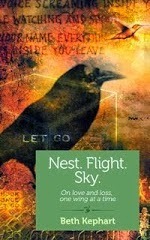 You know that Shebooks publishing venture I've been speaking of? That ever-growing cache of stories and memoirs—written by women to be read in one sitting? That brain child of Peggy Northrop and Laura Fraser that has been releasing truly fantastic e-books for a mere $2.99 each, week by week, by writers like Hope Edelman, Jane Ciabattari, Ariel Gore, and Suzanne Braun Levine?
You know that Shebooks publishing venture I've been speaking of? That ever-growing cache of stories and memoirs—written by women to be read in one sitting? That brain child of Peggy Northrop and Laura Fraser that has been releasing truly fantastic e-books for a mere $2.99 each, week by week, by writers like Hope Edelman, Jane Ciabattari, Ariel Gore, and Suzanne Braun Levine?Yes, that one.
Well, a fully enhanced Shebooks site is now live. It features author interviews, videos, extras. It offers a subscription service (currently discounted), that allows readers to buy the books they want at a low monthly price.
(Shebooks is also launching a Kickstarter "Equal Writes" campaign this coming Tuesday.)
My own Shebook, Nest. Flight. Sky. On love and loss, one wing at a time, is the first memoir I have written in many years and many books. It matters to me. Launched early this year, it now sits on the enhanced Shebooks site with extras such as an excerpt, a reading guide, and an interview which begins like this, below:
What prompted you to write Nest. Flight. Sky.?
I teach memoir at Penn, I’ve written about its glories, challenges, and consequences in Handling the Truth: On the Writing of Memoir, I blog daily about life (Beth Kephart Books), and once, a lifetime ago, I wrote five memoirs. But it has been many years and many books since I’d dared to write the extended truth. By the time Shebooks emerged, I was desperate to speak. My mother had passed away. I had become obsessed with birds and nests, but I did not understand why. I believe that it’s only in writing toward questions that we find at least some of the answers. I wrote Nest. Flight. Sky. to find some answers.
Birds and nests have been a recurrent theme in your work. What is the origin of this?
Nest. Flight. Sky: On love and loss, one wing at a time is, indeed, about recurrent images. It’s about those birds, those wings, those nests that have entered into all the fiction I have written—one book after another, ever since my mother died. It all began with winter finches tapping on my windowpane in the months after her passing. It became a quest for hawks, for hummingbirds, for flight.
When did you first decide you were a writer?
Do we ever decide that we are writers? Or do we just decide that we must write, that we will not be able to breathe if we do not? I’m not sure, even all these books in, that I am a writer. I think readers are in charge of that decision. I only know that, since I was nine, words and their melodies gave me a sense of being nearly whole.
To read the whole thing, go here.
And local readers, please join me and other writers today at Main Point Books to help celebrate the first year in the life of an Indie. I'll be signing Going Over and Handling the Truth: On the Writing of Memoir. For more on that, go here.




Published on May 24, 2014 04:15
May 23, 2014
Like essays? Read Once I Was Cool by Megan Stielstra: My Chicago Tribune Review
 I love it when I love the books the Chicago Tribune sends me to read.
I love it when I love the books the Chicago Tribune sends me to read.Recently I had the pleasure of a Tribune-initiated introduction to Megan Stielstra, by way of her new essay collection, Once I Was Cool.
My review, which runs in this weekend's Printers Row, begins like this, below....
and can be read in its entirety here.The world is a mess. Noisy. Prickly. Guilty. Fidgety. Hot. A case of psoriasis, holes in the ozone layer, rivers running this way and that. Who has time to make room for 29 new personal essays by Megan Stielstra, a Chicagoan whose life — as a storyteller, teacher, writer, wife, mother — is kind of messy too.




Published on May 23, 2014 11:42
Paperback release/FLOW: The Life and Times of Philadelphia's Schuylkill River
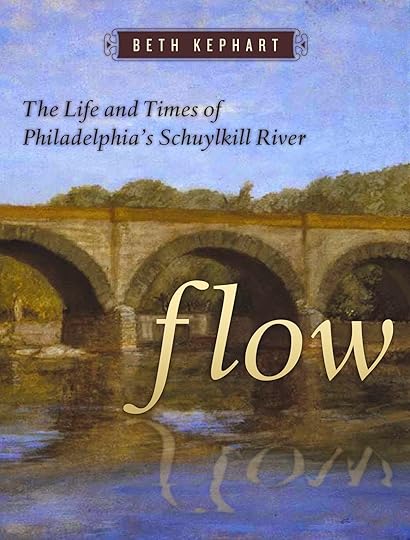 Today, Flow: The Life and Times of Philadelphia's Schuylkill River, a book Temple University Press first released in 2007, arrives as an affordable ($14.95) paperback.
Today, Flow: The Life and Times of Philadelphia's Schuylkill River, a book Temple University Press first released in 2007, arrives as an affordable ($14.95) paperback.People often ask me what my favorite book is, and I refuse to imagine an answer; each book has, in its own way, spurred me, slayed me, invigorated me, quietly pleased me. I have fought and rooted for each one, and, believe me, I still do.
But Flow is one of those books that I really fought for—this retelling of a river's voice in her own words that I submitted to various presses without a positive response until finally I struck up a conversation with Micah Kleit at Temple University Press. When I called Micah several months after my submission certain that he, too, would pass, he corrected me. "We're not precisely sure what this book is, or how we will categorize it," he said. "But we're definitely going to do it."
And Temple did. Adam Levine, a beloved city archivist, helped me locate images of the river over time. Gary Kramer, Temple publicist, made sure that the book got noticed, and soon, also with the help of Marketing Director Ann-Marie Anderson, I found the book in the pages of most area publications, found myself in standing-room-only readings at the Free Library and the Water Works (among other places), and found myself engaged in an important dialogue about Philadelphia and its past and present.
A conversation I'm still having.
Flow is a book about hope and redemption, a book in which I imagined myself as a river, which is to say a woman caught in perpetual middle age, a woman once spectacular then sullied and abused, a woman finally on the verge of hope as visionaries worked to undo many centuries worth of environmental damage, a woman at long last in love.
Today, all these years later, Flow is the book that (and I am so grateful) many memoirists mention when researching the possibilities of the first-person voice. It is being adopted by middle schools as part of combined literature/environmental science programs (I will, for example, be visiting St. Albans Lower School next spring, on the campus of the National Cathedral in Washington, DC, where the book is the required 7th grade read). Thanks to Karen Young, it has become integral to the programming of the Fairmount Water Works Interpretive Center. And thanks to Kurt Zwikl and Laura Catalano of the Schuylkill River Heritage Area, Flow will be part of two keynote talks I give in the fall (at Montgomery County Community College and at Trinity Urban Life Center), as the city celebrates the Schuylkill as the Pennsylvania River of the Year.
Flow begins like this:
Rising
From within the fissure I rise, old as anything.
The gravel beneath me slides. Blueback herring and eel, alewife and shad muscle into my wide blue heart, and through. The smudged face of a wolf pools on my surface, and for that one instant I go blind.......
And when it was first released, some very kind people wrote these words about it:
“Kephart’s Flow is just a sumptuous book—haunting, poetic, lit up with gems of beauty and history.”— Buzz BissingerFrom the length (I apologize!) of this blog post, I'm sure you can tell: I am beyond delighted that Flow will now be available as an affordable paperback, as soon as it moves out of the warehouse into stores.
“Flow is seductive, thrilling, irresistible, life-changing. You cannot help but be swept away.” — Sy Montgomery
"Kephart is a master not only of descriptive memory, but of constructing an existential vocabulary. Thus the river is born, becomes aware, is besieged, comes to terms with abuse, half-wishes to be abandoned, and nearly loses hope." —Nathaniel Popkin, City Paper
“Most autobiographies are a shameful, voyeuristic addiction of the public (thanks Paris, Monica L. and Jenna). But when a river—yes, a free flowing watercourse—releases an autobiography, it goes proudly on your coffee table to advertise your intelligent indie reading. Flow: The Life and Times of Philadelphia's Schuylkill River is chock full of memories and moments from the river's lifetime. Okay, so it was penned by Beth Kephart, a regional writer whose résumé overflows with awards. But the powerful words and imaginative musings come directly from the rises of the river, with retellings from poignant events dating back to the colonial era.” — AroundPhilly.com




Published on May 23, 2014 02:22
May 22, 2014
remembering my mother on her birthday
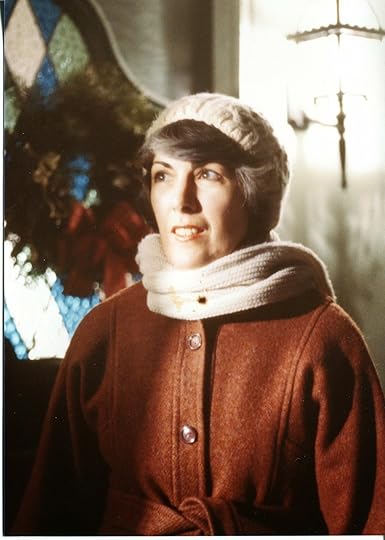 My mother, in photograph taken after a snowy walk, years ago.
My mother, in photograph taken after a snowy walk, years ago.I think of her every day, and especially today, on her birthday.
Happy Birthday, Mom.




Published on May 22, 2014 07:03
May 21, 2014
In HuffPo: On teaching the Berlin Wall, at a Philadelphia High School
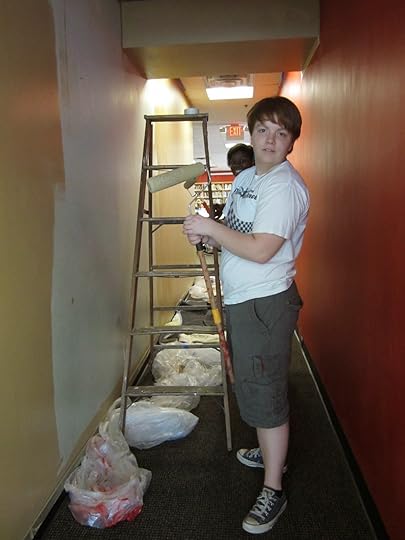 A few weeks ago I taught the Berlin Wall at a Philadelphia school where graffiti is part and parcel of the capstone process.
A few weeks ago I taught the Berlin Wall at a Philadelphia school where graffiti is part and parcel of the capstone process. I tell that story today on Huffington Post.
I speak of this young man, the interim librarian at Science Leadership Academy, among other things.




Published on May 21, 2014 12:10
May 20, 2014
seeking the sound of silence, living with the noise inside my head
 For more than two months now, as my friends know, I've lived with noise inside my head.
For more than two months now, as my friends know, I've lived with noise inside my head.Not the imaginary noise, not the songs that won't stop playing, not angst. I'm talking about an actual jackhammering, geiger-counting, tick tick tick that caused one doctor (who could hear it himself) to take a long step back in surprise. The cause, that same doctor thinks, is a muscle spasm tied to the radical jaw surgery I had many years ago, when my lower jaw no longer connected to the upper. (A genetic misfortune.)
It's taken some doing, growing accustomed to this.
Now, the woman who craved silence, requires silence, can't live without silence, must seek noise—atmospheric bird call, rain drops, train rumble, anything in real life or channeled through a white-noise machine—to cancel out the splatter inside her head. She walks around with ice packs pressed to one ear, tries out Advil and muscle relaxants and decides against, stops drinking that single glass of wine she once enjoyed, in case the wine is somehow implicated in this business. She tries to hear past, concentrate harder, go beyond, be pleasant, but the rumble is nearly always there. It is the first thing she hears, and the last.
And then, as on this very morning, there is a sudden spell of silence.
I don't know, anymore, what is certain, in all of this. Whether this is just some game my muscles are playing, some hide and seek with insanity, some temporary beat this.
I only know how gloriously grateful I am for these interludes of silence. How I'll never take silence for granted again. How, when I see the many people out there who face far more than this—a damaged sense, a lost limb, a difficult diagnosis, a drowning sorrow—I respect them more than I ever did. There but for the grace, I think. For it is grace that all of us seek.




Published on May 20, 2014 07:13
May 19, 2014
When YA and A are valued equally, with thanks to Main Line Today and Main Point Books
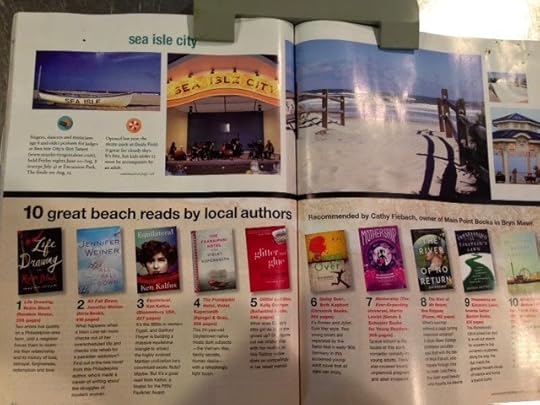 Anybody who knows me knows how I feel about labels. Applied to people. Applied to literature.
Anybody who knows me knows how I feel about labels. Applied to people. Applied to literature.Still, those of us who write young adult fiction must, at times, face those who suggest that it is a lesser form, not nearly as important as the work written expressly for adults—a problem I discussed in a story for Publishing Perspectives titled, "Removing the YA Label: A Proposal, A Fantasy."
(Those of us who write quote-unquote literary contemporary YA fiction must also endure the suggestion that John Green has singlehandedly ushered in this genre's golden era, but that's a topic for another conversation, and we must be careful not to blame John Green for what is written about him.)
The problem with the YA-is-lesser assessment is that the YA writers I respect aren't writing down, aren't writing in haste, aren't writing with any less literary ambition than those who write novels for adults. We're just writing stories that happen to have younger protagonists at their heart; often we're writing "whole family" tales. Always, if we're serious about this stuff, if we're writing not toward known trends but toward felt story, we're writing as best as we can.
And so I will admit to feeling equal measures of joy and peace at finding Going Over on the Main Line Today list of 10 great beach reads by local authors. Not 10 YA books. Just ten books by authors ranging from Robin Black and Jennifer Weiner to Kelly Corrigan and Ken Kalfus. Ten books curated by Cathy Feibach of Main Point Books, who has made it her business, in this, the first year of her store's existence, to get to know who is writing what and to evaluate each book on its own terms.
I am honored. And I am looking forward to next Saturday, when I will drive down Lancaster Avenue and stop in Bryn Mawr and spend an hour signing both Going Over and Handling the Truth: On the Writing of Memoir in Cathy's store. My signing caps a full day of signings, the details for which are here. And when I'm not signing, you can be sure that I'll be buying the books I want, seeing straight past their labels.




Published on May 19, 2014 06:17
May 18, 2014
In today's Philadelphia Inquirer, an excerpt from GOING OVER
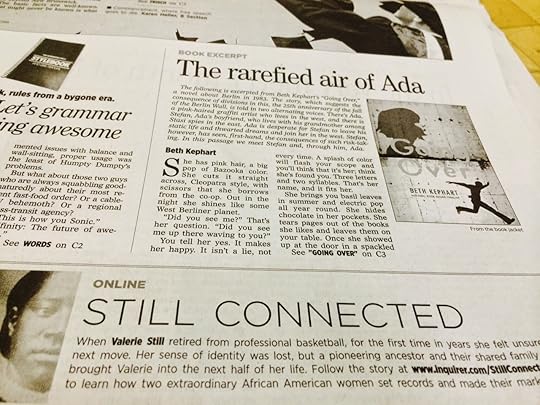
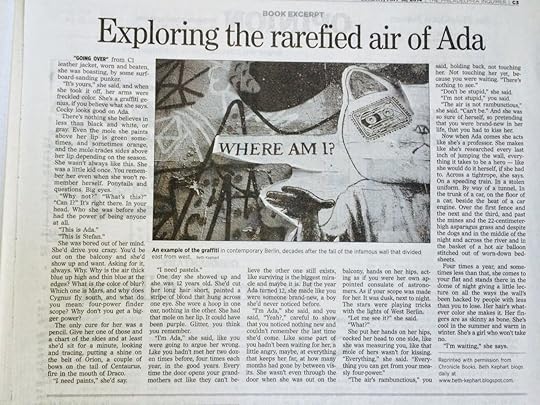 With gratitude, as always. I do know how lucky I am.
With gratitude, as always. I do know how lucky I am.Read the excerpt online here.
Additionally, my wonderful friend Karen Bernstein—she of gifts from Diane Keaton, she of brilliant Going Over pots—reports that she found Going Over on page 71 of the new issue of Main Line Today Magazine listed as one of the "ten great beach reads by local authors." Huge thanks to Karen, and to the magazine.
I have always loved being local.
Speaking of local: Come celebrate the first year in the life of Main Point Books next Saturday, when a fleet of super cool local authors will be signing books. I'll be there at three o'clock with both Going Over and Handling the Truth: On the Writing of Memoir . More on the day can be found here.
Finally, more on Going Over can be found here, through the hugely generous BCCB review.




Published on May 18, 2014 02:05
May 16, 2014
The (sort of incredible) Bulletin of the Center for Children's Books review of GOING OVER
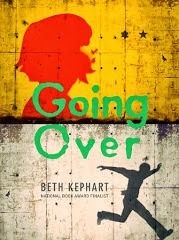 No words for this Bulletin of the Center for Children's Books review of Going Over. With huge thanks to whomever took the time to read and to craft these words.
No words for this Bulletin of the Center for Children's Books review of Going Over. With huge thanks to whomever took the time to read and to craft these words.Sincerely grateful.
Bulletin of the Center for Children’s Books
June 2014
“A keenly intimate story of human love made epic by circumstances.”-- Bulletin of the Center for Children’s Books
The Berlin Wall divides fifteen-year-old Ada Piekarz from her boyfriend, Stefan, in 1980s Germany, and vibrant, rebellious Ada, “Professor of Escape,” desperately wants Stefan to make the dangerous trek over the wall to freedom and to her. In West Berlin, Ada lives with her depressed mother and worried grandmother in a squatter’s co-op, working in a day care for the children of immigrant Turkish laborers, and, by night, illegally creating spray-paint murals on the Berlin Wall to celebrate those who have safely escaped from the Communist-controlled East. She’s determined to see herself as the person who can take care of herself and everybody else, but her inability to fight the world is tearing at her and making her push Stefan; her pressure becomes stronger as she deals with the aftermath of her own rape and seeks to rescue one of her beloved young charges, who disappears after indications of dangerous domestic violence in his family. Brave and heartfelt Ada is an arresting character, appealing as a committed activist, a punky urban artist, and a young girl in love (she and Stefan, whose grandmothers were girlhood friends, grew up knowing each other). Stefan’s yearning for her, expressed in chapters addressed entirely to her in the second person, seems utterly justified even as it’s clearly tied into his yearning for all kinds of change and liberation. Kephart’s crystalline, resilient prose vividly evokes 1980s Berlin, with elders still deeply marked by World War II, the gulf between East and West tantalizingly narrow (Stefan can sometimes see Ada from his balcony), and the economy running on an ill-paid foreign underclass. Sure, there’s plenty of political extrapolation to current events and issues, but it’s also a keenly intimate story of human love made epic by circumstances.




Published on May 16, 2014 15:24
your poem for the day, by Rick Mulkey
Published on May 16, 2014 08:14





